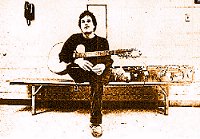A Fast, Sweet 12-String Serenade From the Oblivion Label
by Jim Jerome
Page 2
After the two one-way trips to Oblivion, Kottke sent some old tapes to John Fahey at Takoma Records and after a long wait, got to record them on the now-classic Leo Kottke -- 6 and 12 String Guitar album, which has become his trademark, as he usually opens and closes sets with selections from it. For his devoted followers, the album has remained a litany of undiluted brilliance and commitment. Two Takoma releases led to a Capitol contract and four albums over the past three years, and a certain amount of success.

|
Kottke's instrumentals are striking because they are essentially quite simple. He plays $800 custom 12's -- one a cutaway with a neck two inches longer than normal. This allows for open tuning much lower than pitch, but with very tight stringing. The result is a remarkably deep resonance from bass to high leads. When cleanly amplified onstage, Kottke's thick green bottleneck gliding up and down the neck generates ethereal chord showers, prominent bass lines and a dancing melody. Somehow, all of it fits tightly into his awesomely kinetic picking schemes.
In concert there is always the chance that a poor sound system will blur this effect, making his work frantic and fuzzy. But most witnesses leave with a solid existential assurance that, indeed, there was no dubbing, that it was all hand-woven right there.
Kottke would obviously rather headline the show and play for a sympathetic crowd, yet ironically he remembers that "the best night of my life was as an opener for Mahvishnu in Williamstown, Massachusetts. We were in the most beautiful room I think I've ever seen, a gorgeous chapel. We both did the best sets either of us ever did, I believe. It just kept fizzing, my hair just stood up on the back of my neck all night. It was terrific."
Technically, Kottke's guitar playing is beyond attack. It's his crooning that has gotten him into trouble. "I ignore the ones who say I sing like shit. I really don't care. There are just some tunes that are better sung. I'm no dummy, though. I know the instrumentals sold well. But I've got a whole slew of new ones for my next album, in the fall."
Kottke's singing is not so much offensive as irrelevant, especially to guitar freaks who consider it an unnecessary detour. These purists doubtlessly take their cue from the master himself, who wrote his own liner notes to the grand and mute Takoma lp: "Finally, consider Kottke's voice, he wrote with characteristic humility, "which sounds like geese farts on a muggy day."
Whether Kottke is the greatest, one of the greatest, or neither, no other 12-string virtuoso can boast as he can about making it big in radio and TV filler: "My music has been through a dozen mutations," he says. "They were using it on 'The Dating Game' while the girl was trying to figure out which of those three guys to take to Miami; the piece the used was 'Vaseline Machine Gun.' Then a segment of 'First Tuesday' about treating seals for some kind of infection. And on sermonettes in Dallas, intros to news reports, commuter reports in Boston and devotional spots on New York radio (WHN). Tell you the truth I'd rather hear my stuff than what they usually play behind some sermonette or some old lady reminiscing in a funeral parlor on her organ."
And what is Kottke's music?
"It's primitive American Guitar Music," he answers, "That's what Fahey called it, but I thought that a little grand...It's the kind of music everybody tries to play when they start out, unless they are convince they're the next jazz messiah. It's self-taught, heavily imbued with early radio hits...a common denominator music that runs the risk of being a lot more lame than most.
"I really do believe my music is like a scenario," he declares. "The songs disseminate information. I just move from place to place and write my own tune as I go." [The End]